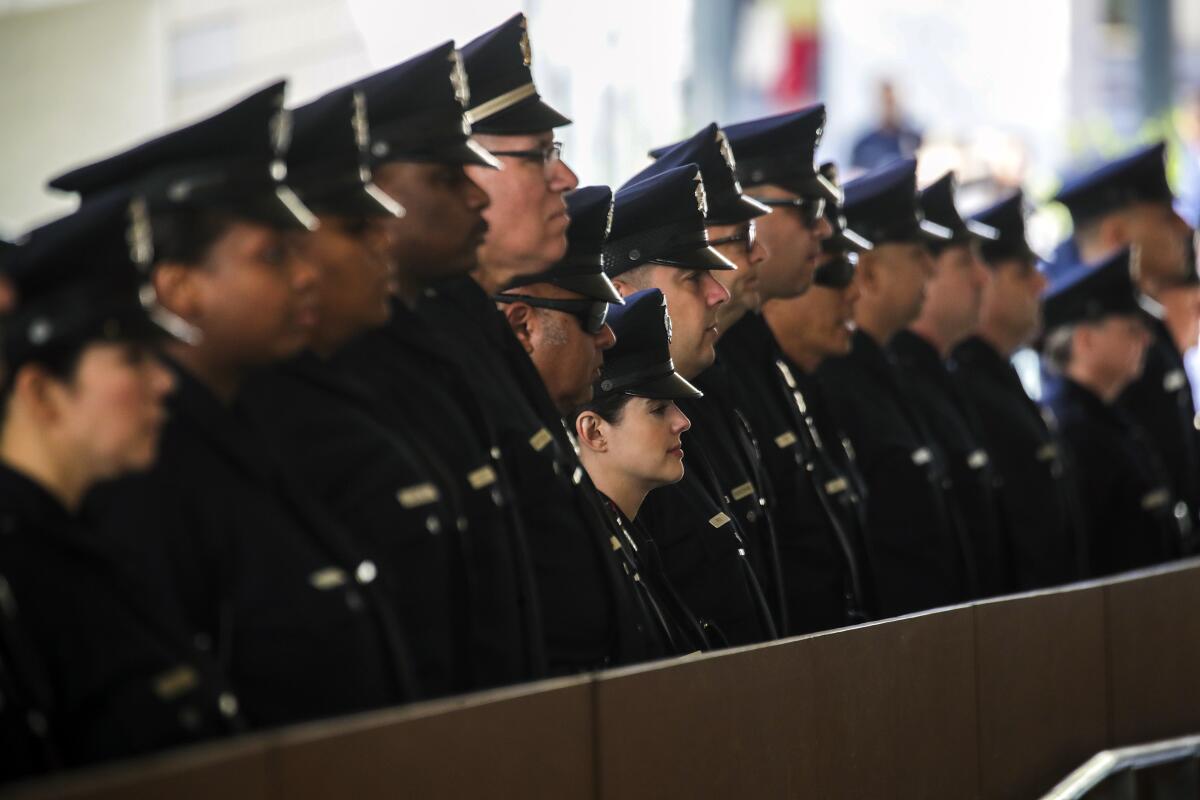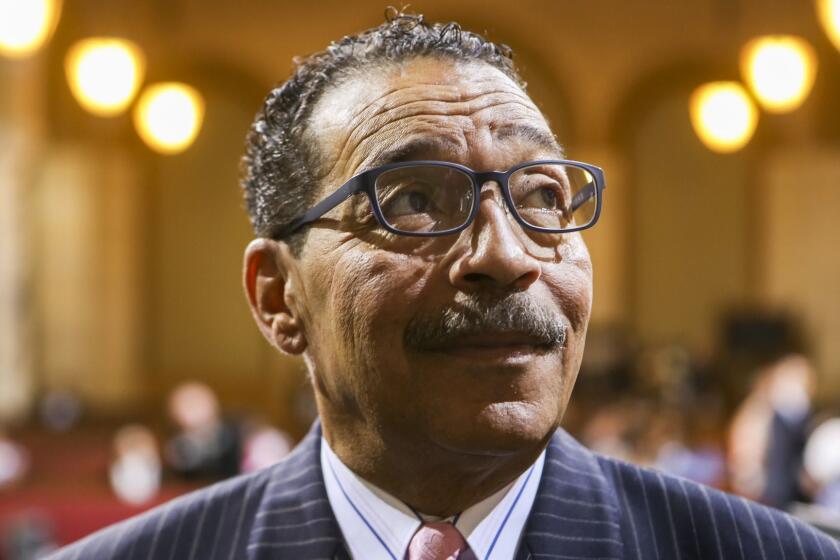Editorial: Lenient all-civilian LAPD discipline panels let bad cops off the hook

- Share via
The Los Angeles Police Department has 69 officers on its payroll whose misconduct was so egregious that the chief would have fired them if he had the authority that the L.A. County sheriff and many other law enforcement leaders have.
Some of the offending officers were shockingly reckless and endangered the public by repeatedly driving drunk or losing control of their service weapons. Some fired their guns when they shouldn’t have. Some lied to their superiors, or didn’t notify them when they were arrested or charged by another agency with battery or domestic violence. Many now have records so tainted by dishonesty or unreliability that they can’t testify in court without undermining the case, so they can’t be assigned to any task in which they might interact with the public or be directly involved in fighting crime.
They continue to earn the pay and pension of a police officer while sitting in non-law-enforcement positions that should be filled by less costly civilians.
After Los Angeles voters approved a ballot measure to remake a key part of the police disciplinary process, City Council President Herb Wesson promised a series of hearings around the city on LAPD reform and the kinds of complaints about policing that have riveted the nation’s attention over the last several years: Excessive force.
In each of those 69 cases, and in many more in which Chief Michel Moore asked for long suspensions or other serious discipline, he was blocked from dispensing appropriate discipline by a three-member panel known as the Board of Rights.
Moore told The Times editorial board in 2020 that the Board of Rights was undermining his ability to uphold acceptable standards of officer conduct. The public expects him to fire bad officers, he said, and he needs the power to do it.
But since 2019, under a system approved by voters and put in place by the City Council, those boards have become even more lax on officer discipline.
Last week, the Police Commission heard reports from the department and the inspector general on the changes, which allow officers facing discipline to choose panels consisting solely of civilians, who repeatedly have been shown to be more officer-friendly than boards that include high-ranking department staff. Commission members expressed deep concern at what they heard.
Charter Amendment C, which voters approved Tuesday, undermines a key component of the Los Angeles police discipline system by granting officers an option to choose a historically more lenient group of judges when they’re accused of violating department policies.
But no one has any right to be surprised. From the Christopher Commission that convened after the Rodney King beating in 1991, to the federal monitors overseeing the department after the Rampart corruption scandal a decade later, to the many reports and reviews that came before the council in recent years, to the inspector general’s 2021 audit and his full report last month, the diagnosis is consistent: The Board of Rights is the weak link in L.A. police accountability. The exclusion of captains and other top LAPD officials from the boards exacerbates the problem.
Charter Amendment C, the ballot measure that made all-civilian boards possible, was a scam, slyly steered to the May 16, 2017, ballot by the council on behalf of the Police Protective League, the union of L.A.’s rank-and-file police officers. There was no other citywide issue or office on that ballot, so few voters participated. Among those who did vote, many undoubtedly believed they were enhancing accountability instead of undermining it. Opponents had the facts on their side, but not much political savvy. They failed to submit ballot arguments. Karen Bass, then a member of Congress, came out strongly against the charter amendment — but not until the day before the election. Her robo-call message to voters was hampered by technical problems.
To take effect, the measure had to be adopted by the City Council, and council members promised detailed hearings on police accountability but failed to deliver. A 2019 ordinance permitted the council to review and reconsider it two years after it took effect — and that’s where the city finds itself today.
The board that reviews his disciplinary decisions is overly lenient, he says.
The Police Commission voted last week to send the LAPD’s and inspector general’s critical reports and recommendations for change to the council.
It’s a very different council from the one that pushed the charter amendment onto the ballot and adopted the follow-up ordinance. It includes members who are police skeptics, to put it mildly. They and the rest of the council owe the city a more thorough and transparent analysis of police discipline and accountability than their predecessors gave the issue.
Bass, now mayor, can lead by weighing in with a well-considered — and a more timely — statement of principles and objectives.
All would be wise to study parallel efforts at the county, where poorly trained department advocates, hired by the county to defend the sheriff’s decision to fire deputies, were consistently outclassed at Civil Service Commission hearings by top-flight lawyers provided by the deputies’ unions.
The LAPD recommends doing what the county did — bumping up the quality of its advocates at Board of Rights hearings. Of course, the department wants a budget increase for that. The council has to ask itself whether that’s the right answer — and whether a fuller overhaul, perhaps including a ballot measure to reverse the previous one, is in order.
More to Read
A cure for the common opinion
Get thought-provoking perspectives with our weekly newsletter.
You may occasionally receive promotional content from the Los Angeles Times.











